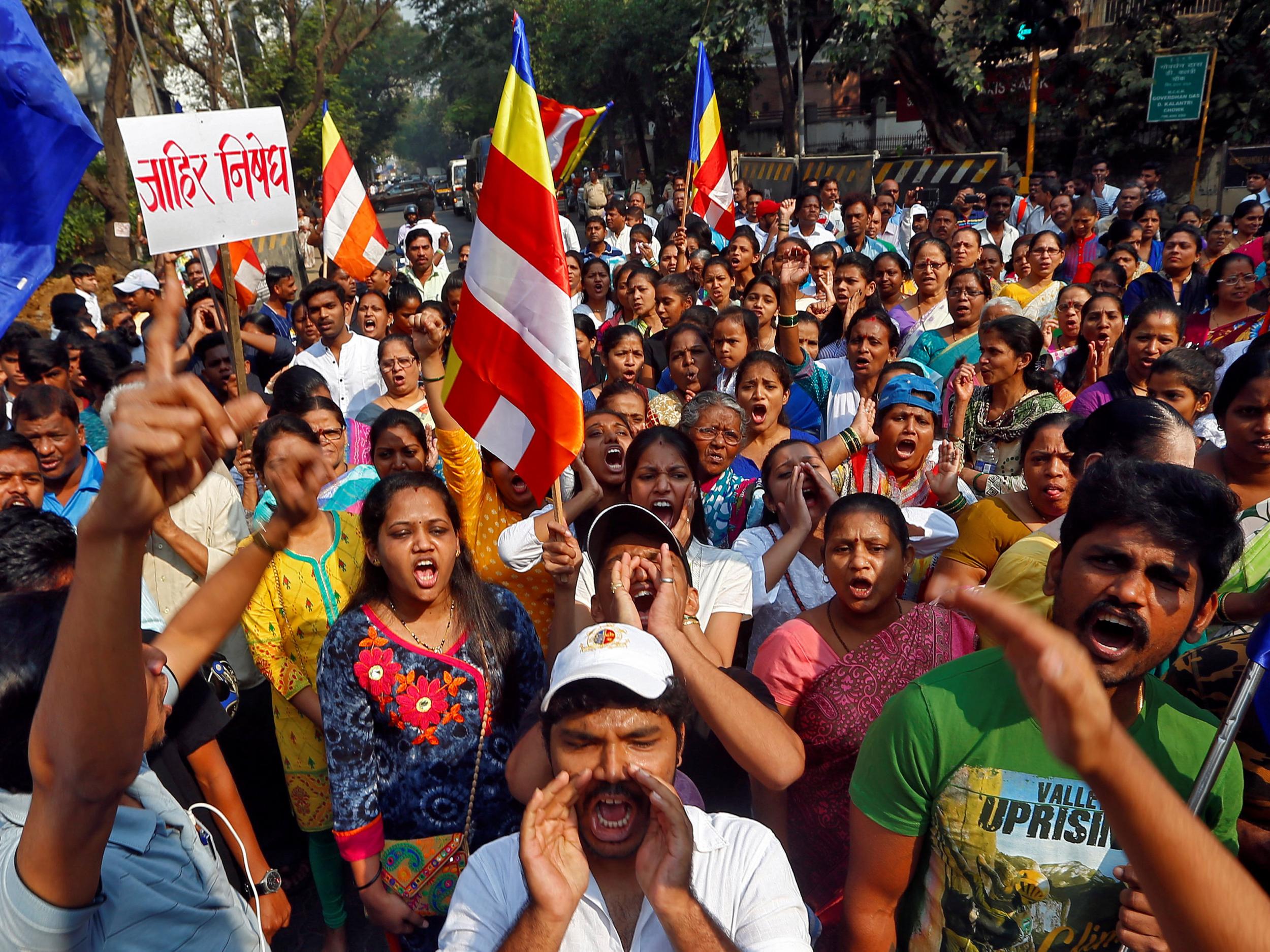The Mumbai Dalit strike is just the beginning of unrest in India
Many Dalits had hoped the new BJP government, which talked loudly of development, would help them to progress through better jobs. Those dreams, now shattered, are turning to anger


Your support helps us to tell the story
From reproductive rights to climate change to Big Tech, The Independent is on the ground when the story is developing. Whether it's investigating the financials of Elon Musk's pro-Trump PAC or producing our latest documentary, 'The A Word', which shines a light on the American women fighting for reproductive rights, we know how important it is to parse out the facts from the messaging.
At such a critical moment in US history, we need reporters on the ground. Your donation allows us to keep sending journalists to speak to both sides of the story.
The Independent is trusted by Americans across the entire political spectrum. And unlike many other quality news outlets, we choose not to lock Americans out of our reporting and analysis with paywalls. We believe quality journalism should be available to everyone, paid for by those who can afford it.
Your support makes all the difference.India’s financial centre – the city of Mumbai – has been partially paralysed since Monday. Protesters have burnt buses, forced shops to close, disrupted the railways and caused untold financial damage. A general shutdown across the state has just been narrowly averted.
Those protesting are “Dalits”, a reference to their low-caste status in the Hindu social hierarchy that dominates India. There are over 200 million Dalits in India – almost a fifth of the population – and they have every right to be angry.
The spark came on New Year’s Day. This year is the bicentenary of a decisive battle between British forces and local Hindu rulers called the Peshwas. Tens of thousands of Dalits had travelled to a small village near Pune city to commemorate the event.
But here’s the twist. The Dalits fought with the British against the upper-caste Peshwas who had treated them like dirt. As far as the Dalits are concerned the battle was one step forward in their emancipation. In 1927, the spiritual leader of Dalits, BR Ambedkar, also a titan of the Indian freedom struggle, paid tribute to the battle and the tradition has continued since then.
Hindu nationalists were predictably aggrieved. Why celebrate a victory of the British against Indian rulers, they ask, ignoring the oppression that Dalits faced. As the celebrations started to wind down, groups of saffron-clad nationalists started attacking Dalits and left one man dead. That sparked the larger counter-protests.
But this isn’t just about one death. This controversy is a microcosm of the upheaval in India. Anger among “lower-caste” Hindus has been building up for years, over how they continue to be treated in Indian society. Lower-caste Hindus still face horrific levels of violence, rape and property theft against them – the police does little to help.
It also illustrates how the Indian establishment avoids taking Dalit concerns seriously. The police failed to provide them with adequate protection and only came out in force when Dalits did. Journalists in the national media, also dominated by upper-caste Hindus, routinely accuse them of “poisoning” the country for demanding change. One editor even claimed he was a Dalit (“shudra”) caste “when I’m cleaning things”. Dalits are usually only allowed to do the worst, most menial jobs in society. Such shocking attitudes are everywhere.
India’s Hindu nationalists talk about making their country great. But theirs is a vision restricted only for the upper-caste Hindu elite. Lower-caste Indians and other religious minorities aren’t just ignored, they are accused of being “anti-national” if they demand equal rights.
The saffron-flag waving Hindu nationalist movement has nothing to say about India’s caste elitism. It ignores the daily violence against lower-caste Hindus. It has nothing to say about oppression other than casting themselves as victims against Muslims.
This attitude isn’t restricted to India either. British Hindu groups are dominated by the same upper-caste, middle-class elite. And so, inevitably, they dismiss any idea of caste discrimination here as some sort of a British conspiracy despite mountains of evidence.
Many Dalits had hoped the new BJP government, which talked loudly of development, would help them to progress through better jobs. Those dreams, now shattered, are turning to anger.
Nothing shakes the lethargic Indian establishment from its complicity in Dalit oppression quite like street riots. And yet, not much changes even then. The media and politicians just criticise them for creating chaos and move on. The anger in Mumbai today is merely advance warning of a bigger wave of rage that is coming.
Join our commenting forum
Join thought-provoking conversations, follow other Independent readers and see their replies
Comments